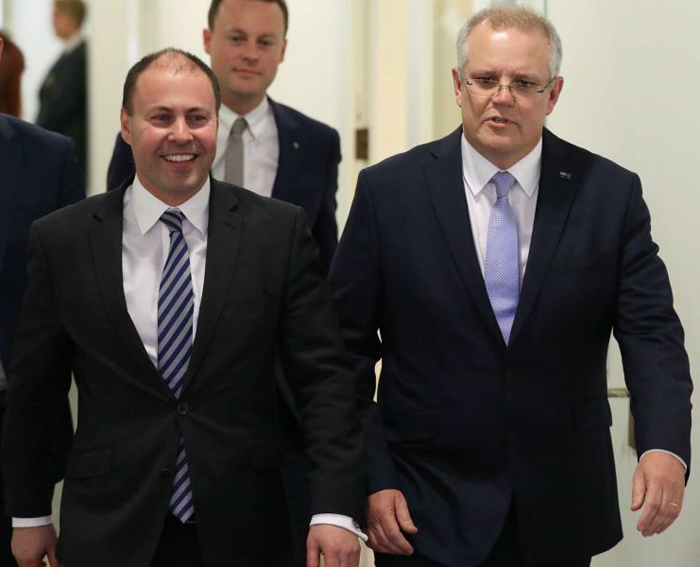Tony Abbott may have lost the fight for Peter Dutton to become prime minister, but he has seen off Turnbull along with his minimal climate policy.

New treasurer-to-be Josh Frydenberg can scarcely believe his good fortune as he leaves the Liberal party room with PM-designate Scott Morrison.
There’s a good argument that the remarkable events of last week were simply our rough-hewn institution of parliamentary democracy working as it was always meant to work.
Our representative system is designed to ensure that all points of view in public life are fairly represented in decision-making at the top. It’s a safety valve to stop dissent from turning into an angry mob – a bit messy, but nowhere near as messy as that angry mob.
Leaders like to claim a mandate from the people. Bob Hawke did so when Paul Keating challenged him in 1990; so did Kevin Rudd when Julia Gillard took his job in 2010, and Tony Abbott when Malcolm Turnbull overthrew him in 2015. But they were all wrong.
Under our representative system, Scott Morrison is prime minister not because we the people say so, but because that’s what most members of the main party in the parliament’s majority coalition have decided. The voters get to determine the majority; the majority gets to choose a leader.
Unfortunately for Malcolm Turnbull, a party can change its mind more than once between elections. Last week, in the first challenge to his leadership since the last election, the Liberals endorsed him; two days later they rejected him. For political fickleness, that has to be a record.
The Coalition will pay a price for that when we next go to the polls. Instability at the top indicates dysfunctional government, and Morrison’s rise to prime ministership – he called it a “new generation” – is highly unlikely to survive the next election.
Tony Abbott might linger longer. Coming out of the meeting that elected Morrison he suggested that he still has work to do to make Australia “as strong and as good as it can possibly be”. That’s as near as he came to explaining why ousting Turnbull meant so much to him.
So we can assume that voicing his loud and angry opposition to the National Energy Guarantee, crafted by former environment minister and now treasurer and deputy Liberal leader, Josh Frydenberg, was also in his mind helping to make Australia strong and good.
I never had much time for the NEG. I saw just one thing in its favour: in the Coalition’s near-empty climate policy locker, this was the one item that might be made to work. Without it, nothing.
Though they never produced modelling to back up their claims, Frydenberg, Turnbull and Morrison all highlighted the NEG’s capacity to bring down power prices and improve supply reliability. Whenever possible they avoided mentioning climate and carbon emissions.
But the NEG in its final form looked like something the Labor opposition might support – a scheme whose emissions provisions could be toughened up in future. It was looking as if that might yet allow the NEG bill to pass both houses and become law. Alas, no.
Down the years, seeking a consensus on climate policy has been an excruciating experience. A big majority of Australian economists has long argued that economy-wide measures are the most cost-effective way to control emissions, but it took a decade to secure John Howard’s tepid support.
Kevin Rudd’s monumental Carbon Pollution Reduction Scheme bit the dust in 2009 when, as his first act after seizing his party’s leadership from Turnbull, Tony Abbott withdrew Liberal support.
Next, Julia Gillard’s carbon scheme imposed a tax on electricity from fossil fuels. It had a clear, measurable impact on emissions, but Abbott’s three-year campaign against it finally bore fruit with his election win in 2013. A year later the scheme was axed.
Abbott always knew that some in the electorate wanted action on climate, so as prime minister he never quite abandoned the policy space. But “Direct Action” is a dud: an expensive scheme to buy carbon abatement out of the public purse which has had no impact on ever-rising emissions.
Under Turnbull there was always hope, however faint, that something might emerge. Frydenberg supported an emissions intensity scheme but it was scuppered by Abbott-led opposition. The same fate befell chief scientist Alan Finkel’s Clean Energy Target, put together at Turnbull’s request.
The NEG combined the wish to make power more reliable and affordable with the imperative of bringing down emissions, a need that business was increasingly focusing on given rising international pressure to increase Paris commitments.
Now, thanks to Abbott and a small cohort of followers including MPs Barnaby Joyce and Craig Kelly and Tasmanian senators Eric Abetz and Jonathon Duniam, there’s nothing left except the fast-expiring Renewable Energy Target.
Though coal power is already costlier than renewables, the Abbott crew wants public money spent on building new coal-fired power stations. They also claim that we are a minor emitter on the world stage. But Australian emissions are climbing, and per person, we are the world’s largest emitter.
They didn’t get their man in the top job, but they have done their damage. We are all losers.
